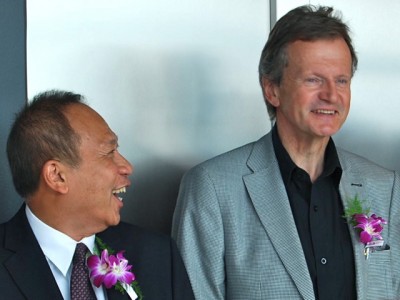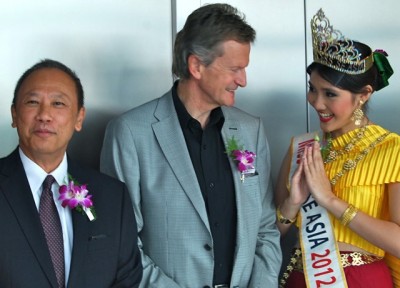NEWS ANALYSIS: Telenor CEO Fredrik Baksaas and Thailand’s ambassador to Norway were all smiles just last summer, when the two celebrated Telenor’s major expansion into Asia through its hub in Bangkok. Now Telenor faces criticism at home in Norway for going along with Thai orders last month to block Facebook, while Thailand’s new military regime is furious with Telenor for revealing the government crackdown on free and open communications.

It would seem that Telenor just can’t win right now. It’s being scolded both at home and in its important Thai hub, with the latter posing a sudden threat to its multi-billion-kroner business from Bangkok. New Thai military officials are furious that Telenor exposed their dishonesty by confirming to Oslo newspaper Aftenposten that its partly owned Thai telecoms firm Dtac had been ordered to temporarily block Facebook access on May 28, following the military coup. The military had claimed Facebook had crashed because of heavy traffic to the social media site. That wasn’t true. The site had been used to help organize demonstrations against the government, and it was the new regime that allegedly wanted to hinder such activity again.
Telenor seems to be stuck squarely in the middle, between the Thai military regime and Thai demonstrators, and between its own concession to the military and critics back home in Norway and the US who advocate the demonstrators’ human rights, freedom of expression and access to the Internet. They, including the US organization Access, believe Telenor has now contributed to violations of freedom of expression, and hindered access to information by blocking access to Facebook.

Telenor’s communications chief in Asia, Tor Odland, told Aftenposten before the military started making threats against Telenor that the situation was indeed difficult for the company. “On the one hand, we follow the international framework including the UN’s position on human rights and business,” Odland told Aftenposten on Tuesday. “On the other hand, we as license holders in Thailand are obligated to follow local laws.” Even when those laws clearly violate freedom of expression and access to information.
On Wednesday, after Thai media had picked up Odland’s comments, the Thai authorities lashed out at Telenor for exposing their order to block Facebook. They branded Telenor’s openness as “inappropriate and disrespectful,” and all but threatened Telenor’s huge investment in Thailand. One top military official told online news service Naew Da that it may find ways of excluding Telenor from participating in auctions for 4G licensing.
That could be a financial and strategic disaster for Telenor, which has become a dominant mobile operator in Thailand and uses Thailand as a springboard for other important Asian operations, not least in neighbouring Myanmar (Burma). By Wednesday evening, Odland had clammed up, refusing to answer any more questions from Norwegian media and telling Norwegian Broadcasting (NRK) that “we don’t have anything more to say about what’s been expressed by regulators in Thailand.”
Meanwhile, in Oslo, the government minister in charge of business and trade, Monica Mæland, told Aftenposten that she couldn’t say whether Telenor did the right thing by obeying the military junta’s order and blocking Facebook. That sort of decision is up to the company’s board and management, Mæland stressed, even though the state has a major ownership stake in Telenor.
Officials at the Access organization, who claim to defend and extend the digital rights of users at risk around the world, was disappointed by the Norwegian government’s position. “As the majority shareholder in Telenor and the company’s home state, the Norwegian government should use all means at its disposal to support the human rights of users in Thailand,” said Access Policy Counsel Peter Micek in a prepared statement. “Junta authorities and regulators are openly threatening the rights of users online. Free expression is not a financial commodity to be hedged and traded, it’s the right of the people Telenor serves.”
Mæland said she had meetings with Telenor in May about the military coup in Thailand, and the difficult situation that could emerge. “Telenor was open at that time, too, that it could be a question of closing off (modes of communications like Facebook) or being closed down,” Mæland told Aftenposten. Now it appears Telenor is faced with both.
“Only the board (of Telenor) can answer such a question,” Mæland said. “But I expect that the company remains socially responsible, and is open about its choices.” It’s precisely that openness, though, demanded at home by its biggest single shareholder, that may cost it dearly in the strict and closed regime Thailand is now under.
newsinenglish.no/Nina Berglund

